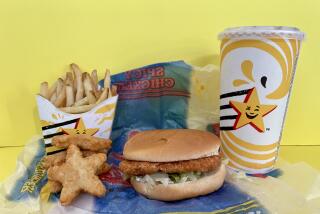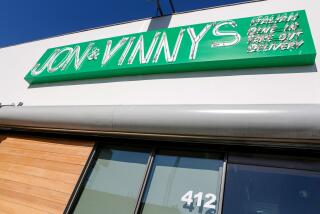Lip Service No Substitute for Genuine Customer Service
- Share via
Suddenly everybody wants to pay us for our inconvenience. The pizza place offers a discount if your food is not delivered in 30 minutes. The restaurant provides free desserts if entrees don’t come in 10 minutes. The bank gives out $5 bills if customers wait more than five minutes in line.
Not everyone wants gifts and rebates. Many want shorter lines and better service, routinely, and they watch the promotions warily. “Anything that will lead banks to compete on service will certainly be appreciated,” says Michael Heffer at Consumer Action in San Francisco, “if it really does result in tangible differences.”
Banks particularly have always given lip service to service, “saying, ‘We’re friendly and give good service’ whether it was true or not,” says Doug Adamson, executive vice president of the Bank Marketing Assn. in Chicago. Today’s claims are different, he says, based on “clear strategies” to alleviate specific service problems.
A third of the consumers surveyed by the trade paper American Banker in 1989 had a complaint about bank service, and half of them closed accounts because of it. Indeed, Adamson says, the two prime reasons for changing banks are moving and bad service, whether the latter involved errors and inaccuracy, inefficiency, slow response, or just the “obvious perception that the waiting lines were getting too long,” says Don Routh, vice president and senior production manager at San Francisco-based Wells Fargo Bank, which guarantees a “Five Minute Max” wait or $5.
As a result, current promotions feature not just promises but guarantees, backed by cash or discounts because, says Routh, “We’re serious enough to put money behind it.” Some are general, like 1985’s pioneering “no-goof guarantee” at First Wyoming Bank (now Key Bank of Wyoming) that offered $5 if anyone caught the bank in a mistake--a novel ploy at the time. Some are specific, such as Wells Fargo’s current “Five Minute Max” promotion, or its previous promotion offering $10 to anyone whose ATM deposit wasn’t credited correctly or on time.
Some are crashingly simple--a buck to customers of Glendale-based Fidelity Federal Savings if tellers don’t greet them by name, smile and thank them. Some are crashingly complicated, like Empire of America’s “comprehensive set” of guarantees--$5 if employees are discourteous, a new telephone if the customer’s call isn’t answered in four rings, a coffee mug if the wait for service exceeds 10 minutes, 1/4% off the interest rate if a loan application isn’t answered the same day, and more.
Banks are unusual only in backing their guarantees with cash. Restaurants back theirs with food; such “time guarantees” are almost standard in the Midwest, says Tom Wirt, executive vice president of marketing for Bakers Square restaurants, which offer free pie if an “express lunch” isn’t served in 10 minutes.
But behind the gifts and guarantees, there had better be service. “If you promise me short lines, and I go and find long lines,” says retail consultant Norm McMillan of McMillan/Doolittle in Chicago, “I am now madder than I was before.”
Vons supermarkets in California and Nevada back their guarantee of checkout “Super Service,” with “customer service dollars,” but behind it are studies of traffic patterns as recorded in the computerized registers, and new staffing arrangements that stagger checker shifts and provide floor clerk backup. The result: a promise to open a new check stand whenever more than two people line up and to keep all check stands open from 3 to 7 p.m.
Wells Fargo spent two years preparing its “Five Minute Max” program, tracking the customers and kinds of transactions in given time periods and setting standards that range from 15 seconds for the four simplest transactions (deposit, withdrawal, check cashing, loan payment) to seven minutes for large merchant transactions. Then they staff for two separate lines with guaranteed waits of only five minutes.
If the point is service, the food and money seem tangential, even distracting. But they have an effect on employees. Bakers Square’s 10-minute guarantee, for instance, depends partly on front-desk predictions of expected orders but more on kitchen speed, and the pie awards and table timers made employees “much more conscious of the time they were taking,” says Wirt. (The pressure has a downside: Domino’s Pizza has drawn heavy criticism for the number of road accidents in which its drivers have been involved.)
In some cases, money was a “good internal motivator because employees got to keep what wasn’t given out,” says Kym Zwonitzer, vice president of marketing at Key Bank of Wyoming. The original goof awards were paid ($40,000 in all) out of money allotted each branch, and branch employees split whatever was left.
If a promotion is fun and novel, it also gets the business more public attention than any simple claim to good service. And it inspires consumer faith simply because the business seems willing to put money, however little, where its mouth is.
Indeed, it needn’t put much money there. “Five Minute Max” cost Wells Fargo only $10,000 its first eight days (not even one award per branch per day)--much less than the supporting advertising. Such programs certainly beat the costs of poor service: It’s “considerably more expensive,” says Adamson, “to attract a new customer than to retain an old one.”
There’s a more immediate gain. Like many such time guarantees, giving away pies is “a win-win situation,” says Wirt at Bakers Square. Whatever the cost in pie, the promotion “speeds up the service cycle and we turn over more customers.”
Fun has its dangers, of course. The fad may precipitate a plethora of promotions with no change in service behind them. What then will customers get when the promotion’s over and employees aren’t under the gun or pursuing a reward? And having been diddled into thinking of service as a special treat rather than a routine right, what will those customers demand?
More to Read
Inside the business of entertainment
The Wide Shot brings you news, analysis and insights on everything from streaming wars to production — and what it all means for the future.
You may occasionally receive promotional content from the Los Angeles Times.










